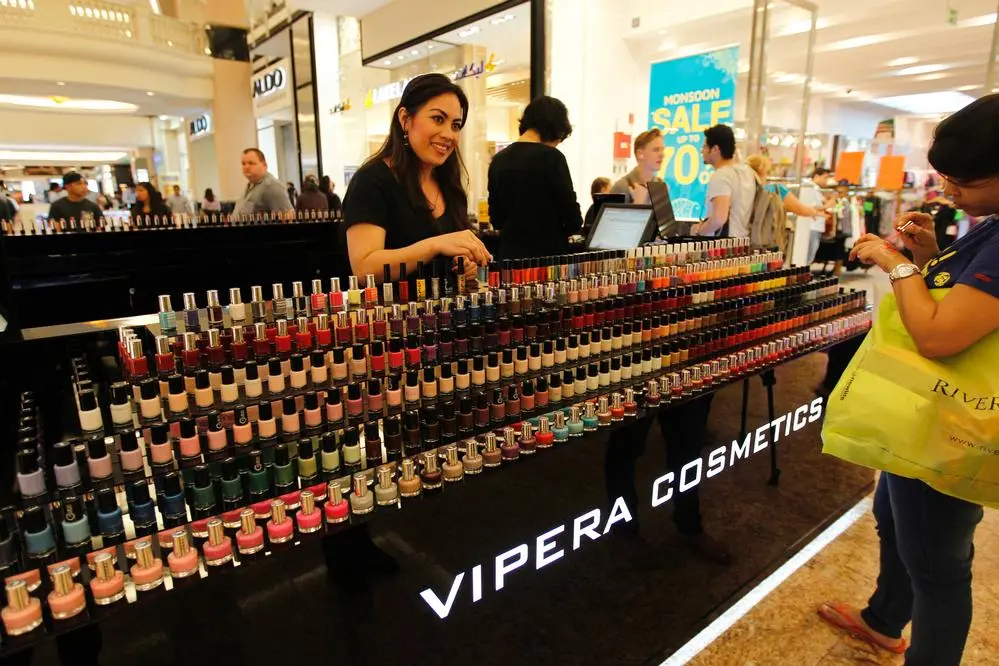PHOTO
The makeup and cosmetics counters in the UAE’s shopping malls and retail outlets have reopened, but it will be quite a while before the shops will be abuzz with customers.
The beauty and personal care market in the Gulf Cooperation Council (GCC) region, which has suffered a slump in demand since the start of the coronavirus pandemic, won’t be back on track until 2024, according to a Euromonitor International analyst.
The UAE market alone is forecast to post an eight percent decline, while Saudi Arabia is set to fall by five percent this year. The slump will continue to be driven by a downturn in local demand, coupled with a decline in expatriate population and international visitor numbers, as well as low oil prices.
“[The] beauty and personal care in the Middle East isn’t expected to get back to pre-crisis levels until 2022, and GCC countries may not be back on track until 2024,” Amna Abbas, senior analyst at the market research firm, said in a recent podcast this month.
“We are seeing expats leaving the country due to job losses, a falling number of tourists and unstable oil prices – all things that most likely won’t change for a least four more years,” Abbas added.
Slump
The UAE and Saudi Arabia are considered among the world’s biggest markets for makeup and skincare products. Saudi women typically rack up $909 in yearly bills, the highest in the world, while Emirati women spend 694 dollars a year, according to a study conducted this year by discount site Picodi.com.
The retail value of the Middle East and Africa (MEA) region’s beauty and personal care market also showed strong growth potential prior to the pandemic, going up by eight percent to $34.9 billion in 2019, from $32.4 billion a year earlier, according to Euromonitor.
The market hit a slump in March when the coronavirus lockdowns were imposed and consumer spending habits shifted. “Consumers prioritised products focused on preventative health [when they were forced to stay at home],” said Abbas.
What brands have done
To cope with the decline in demand, brands in the region have shifted their strategy, with some market players like Unilever Arabia optimising the production of items in resilient categories like antibacterial, hand soaps, wipes and sanitisers.
The brand also heavily campaigned its Lifebuoy soap brand in the past few months, capitalising on the message of maintaining good hygiene and handwashing during the outbreak.
Others have also shifted their attention online.
“Yves Saint Laurent is doing beauty consultations on its website. We are also seeing e-commerce taking off in the region, with companies such as Noon, Namshi, Instashop, Amazon, Carrefour all increasing their brand awareness,” added Abbas.
“In fact, according to Euromonitor’s 2020 digital consumer survey, 49 percent of beauty, health and personal care purchases are made through smartphones in the UAE. But e-commerce is at its peak due to the lockdown, and in the mid-term, we will see brands further investing on online platforms at the expense of brick and mortar stores,” said Abbas.
Over the long term, she said, artificial intelligence and virtual reality are expected to impact the customer’s shopping experience. “These technologies will help replicate the physical experiences of going to a store,” Abbas said.
Prospects for recovery
With regards to consumer demand, Abbas said, consumers will shift towards spending on themselves. They are expected to want to buy again products that will make them feel and look good, and the first ones to recover will most probably be in the skincare category.
“After being in lockdown, they’re going to want to feel good and recover from the crisis phase, while categories such as skincare will pick up faster in the region, reaching pre-COVID levels in 2021 at $4.48 billion. Colour cosmetics and fragrances will reach pre-COVID levels much later by 2023,” she said.
“On a brighter note, malls in the UAE have already opened but they are still operating with strict precautionary measures in place, as ordered by the government after a lockdown that lasted between March and June. Consumers are cautious, yet keen to return to normal life which has led them to step out and slowly resume shopping. Similar patterns are seen across the GCC, with occasional lockdowns put in place, if cases are seen rising,” said Abbas.
(Reporting by Cleofe Maceda; editing by Seban Scaria)
Disclaimer: This article is provided for informational purposes only. The content does not provide tax, legal or investment advice or opinion regarding the suitability, value or profitability of any particular security, portfolio or investment strategy. Read our full disclaimer policy here.
© ZAWYA 2020





















